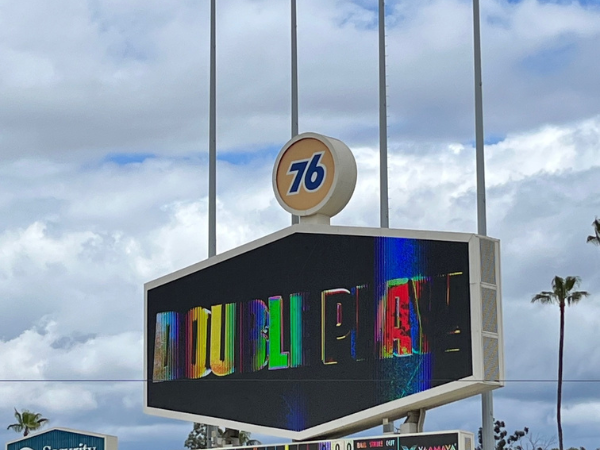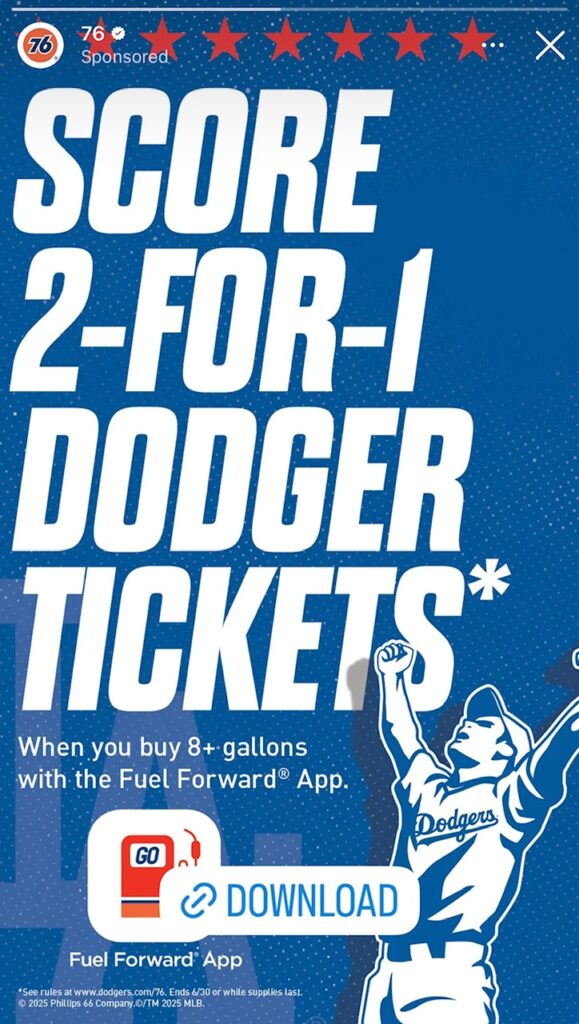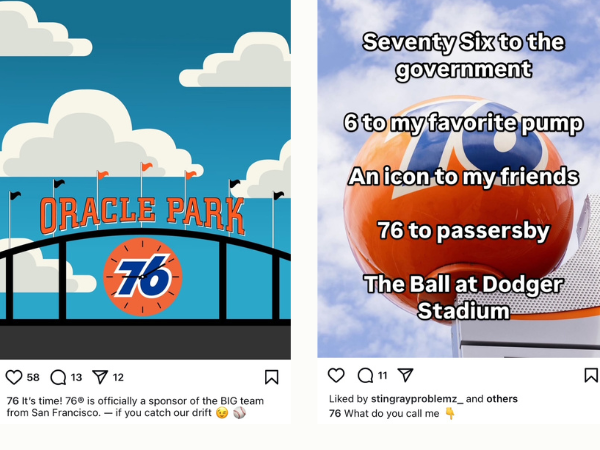If Dodgers Don’t Quit Big Oil, the Olympics May Make Them
The Olympic Committee’s ban on most advertising could finally force the Dodgers to drop the 76 sponsorship from Dodger Stadium, which is now an LA 2028 venue.

The Los Angeles Dodgers have all but ignored the growing calls from fans, activists, columnists, researchers, and a state lawmaker asking the team to cut ties with Big Oil and remove the two huge, orange 76 gas ads that dominate the club’s picturesque scoreboards. But the team’s streak may be coming to an end: They can’t ignore the International Olympic Committee.
When the Olympics come to LA in 2028, Dodger Stadium will be the official venue for baseball and that means the Dodgers will almost certainly be forced to stop their Big Oil advertising during that summer. A review of the rules and bylaws in the Olympic Charter makes clear that “commercial installations and advertising signs shall not be allowed in the stadia, venues or other sports grounds.” Unless there’s a rare exception to these strict rules, the 76 ads in the outfield will come down.
So, the question is whether the Dodgers will meet this moment and cut ties to climate polluters for good or keep shilling for oil and gas after the Olympics leave town.
There’s a strong case for ending the sponsorship much sooner. I recently wrote about a massive $745 million jury verdict against Chevron in Louisiana. It’s an example of the “sportswashing” that oil majors do in major league sports — they fund billboards, bobbleheads, gas giveaways, and science camps for local kids in the hope of promoting their brand to an eager audience and shirking accountability for the environmental harms of their operations. It’s also a good example of people not falling for the ploy. Plaquemines Parish, Louisiana refused to give Chevron a free pass in a trial over decades of coastal damage just because the company sponsors their beloved basketball and football teams.
Los Angeles can learn something from Plaquemines Parish, as we face something similar.
Growing Calls
 Nearly a year ago, my UCLA Emmett Institute colleague Cara Horowitz brought this sponsorship with 76, and its owner Phillips 66, to public attention in a Legal Planet post that asked why the Dodgers continue to sully their reputation by partnering with a company that’s being sued by the state of California for public nuisance and false advertising related to climate change. Her piece was followed by a series of enterprise reports by Los Angeles Times climate columnist Sammy Roth, which spurred a grassroots campaign calling on the Dodgers to end the sponsorship. That brought a petition with 28,000 signatures and multiple protests. Last fall, the Emmett Institute published my survey of major sports leagues that found at least 69 of these sponsorships by polluting companies, including several in California. This February, the Angeles chapter of the Sierra Club held an event with Bill Mckibben, Naomi Oreskes, and a state legislator from Pennsylvania, Rep. Christopher Rabb, to explore the problem and possible solutions. Recently, an influential California lawmaker got involved too — State Senator Lena Gonzalez called on the Dodgers to drop its oil and gas advertisers.
Nearly a year ago, my UCLA Emmett Institute colleague Cara Horowitz brought this sponsorship with 76, and its owner Phillips 66, to public attention in a Legal Planet post that asked why the Dodgers continue to sully their reputation by partnering with a company that’s being sued by the state of California for public nuisance and false advertising related to climate change. Her piece was followed by a series of enterprise reports by Los Angeles Times climate columnist Sammy Roth, which spurred a grassroots campaign calling on the Dodgers to end the sponsorship. That brought a petition with 28,000 signatures and multiple protests. Last fall, the Emmett Institute published my survey of major sports leagues that found at least 69 of these sponsorships by polluting companies, including several in California. This February, the Angeles chapter of the Sierra Club held an event with Bill Mckibben, Naomi Oreskes, and a state legislator from Pennsylvania, Rep. Christopher Rabb, to explore the problem and possible solutions. Recently, an influential California lawmaker got involved too — State Senator Lena Gonzalez called on the Dodgers to drop its oil and gas advertisers.
Through it all, Dodgers management hasn’t made a single comment on the subject and the current baseball season kicked off with 76 gas front and center yet again. The oil company on the other hand eagerly promotes its sports sponsorships. “Collaborating with these respected organizations integrates our brand with consumer passion points,” a Phillips 66 official said about a football sponsorship. In fact, 76 announced in a series of social media posts last Friday that it has signed a deal to be an official sponsor of one of the Dodgers’ rivals: the San Francisco Giants. Apparently, baseball fans will now be gazing at Big Oil ads on both ends of the Golden State.

And yet, there is something different this spring. Phillips 66 is now facing criminal charges related to its LA operations. Federal prosecutors charged Phillips 66 last year with six counts of violating the U.S. Clean Water Act by allegedly dumping oil and grease from its Carson refinery into LA County’s sewer system. At last check, the company could face up to five years of probation on each count and a maximum of $2.4 million in fines.
Those allegations have reinvigorated activists, including some individuals and groups that are organizing around climate resilience after the Palisades and Eaton fires. On May 15, Phillips 66 is set to be arraigned in the case and activists say they will stage a protest procession at Dodger Stadium that afternoon cloaked in sackcloth and ashes — to represent climate grief — accompanied by a bagpiper and drummer. It’s possible that this legal development will amplify the grassroots campaign or that the Dodgers will decide they don’t want a criminally indicted oil company as their most visible sponsor.
One point of leverage that grassroots activists have is that the Dodgers, civic leaders, and elected officials are all-in for preparing quickly for the Olympics. Mayor Karen Bass and other LA officials have also touted a “car-free,” “no-build” Olympics that will be “the most sustainable games.” LA cannot seriously promote a sustainable Olympics to the world with oil advertising in the picture without being criticized for hypocrisy. When LA28 tweeted the Olympics announcement recently, the accompanying photo of Dodger Stadium did include the 76 logos, though you have to squint to identify them.
“Clean Venues”
The sports venues you see during the Olympics and Paralympics are typically free of any sponsor advertising or corporate billboards, which LA 2028 confirmed to me though no one would comment directly on the Dodgers. Rule 50 of the Olympic Charter bars commercial advertising on the field of play and limits commercial marketing even by official Olympic sponsors.
Rule 50 Advertising, demonstrations, propaganda 1. Except as may be authorised by the IOC Executive Board on an exceptional basis, no form of advertising or other publicity shall be allowed in and above the stadia, venues and other competition areas which are considered as part of the Olympic sites. Commercial installations and advertising signs shall not be allowed in the stadia, venues or other sports grounds.
Previous Olympic games have seen the issuing of “clean venue guidelines” that spell out how the host city, athletes, and particular venues can be in compliance with marketing rules. The clean venue guidelines for Vancouver 2010 were so tight that they stipulated the exact type of soap and hand sanitizer that could be displayed at venues. “If there are outside elements present that don’t belong in an Olympic experience (ex: old venue branding or outside sponsor branding), they need to be neutralized.” They even required covering over, or “masking,” the brands of “personal toiletry dispensers” in stadium bathrooms. The charter also makes clear that the IOC alone has “the authority to determine the protocol applicable at all sites and venues.” Given all of this, it’s extremely unlikely that the IOC would issue some exception to marketing rules for Los Angeles in 2028.
LA 2028 has announced a slew of worldwide and official partners — light beer, chocolate, sporting goods — and none of them are oil and gas companies. Maybe, just maybe, Los Angeles can offer an oil-free Olympics even if it’s struggling to make good on a car-free or transit-first Olympics.
The lead up to the 2028 Olympic games period would seem to be a natural time for the Dodgers to reset a marquee sponsor for years to come — and to do so on their own terms — or else be forced to by Olympic rules.
Reader Comments
6 Replies to “If Dodgers Don’t Quit Big Oil, the Olympics May Make Them”
Comments are closed.




Big Oil has nothing to do with baseball!
DUMP THE OIL COMPANY
I WILL NOT B PURCHASING OIL FROM UR COMPANY
I WILL NOT SUPPORT UR TEAM EITHER IN ANY WAY SHAPE OR FORM!!!!!!!!!!!!!!!!!!!!!!!!!!!!!!!
99% of plastics are made from fossil fuels and oil. plastics and big oil pollutes people, animals, plants, our food systems, our water systems and life on the planet.
As a Dodgers fan, I say #NoOilDodgers
99% of plastics are made from fossil fuels and oil. plastics and big oil pollutes people, animals, plants, our food systems, our water systems and life on the planet.
As a Dodgers fan, I say #NoOilDodgers
99% of plastics are oil. plastics and oil pollutes people, animals, plants, our food systems, our water systems and life on the planet.
As a Dodgers fan, I say #NoOilDodgers
76 is struggling to meet its own financial and legal obligations which is a growing concern for both the Dodgers and their fans. Beyond the public backlash, the company faces serious technical compliance challenges that further erode confidence in its operations. Given the mounting controversies and liabilities, the organization’s decline seems both inevitable and warranted. A lowering of its bond rating would be a fitting consequence for a brand that no longer aligns with the values of accountability or sustainability. They must see the disconnect, address it, and offer a constructive path forward.